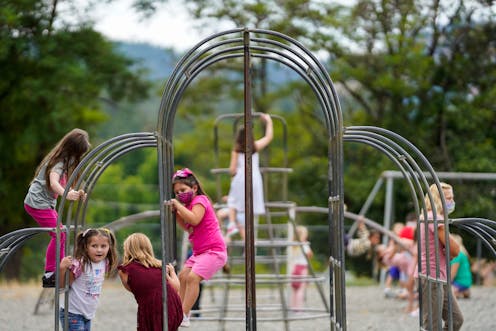How recess helps students learn
- Written by William Massey, Assistant Professor of Public Health and Human Sciences, Oregon State University

As parents and schools seek to support students’ social and emotional needs[1] – and teach them what they need to learn – some education leaders are missing one particularly effective opportunity.
The U.S. Department of Education has offered guidance on how to help students navigate the stress and trauma[2] of the pandemic and readjust to in-person schooling after long periods of closed schools. But as someone who studies recess[3] in connection with child development, I couldn’t help but notice recess was missing from the federal guidance and from many local efforts to support students as the pandemic continues to unfold.
The physical activity[4] and social connection[5] that take place at recess help children’s brains work and develop properly by lowering their levels of stress, regulating their nervous system and allowing them to be more engaged once back in the classroom.
Stress and the brain
The brain function of a person in a calm state is largely governed by the prefrontal cortex, which handles what are often called “executive functions[7]” and the ability to regulate behavior and emotions. This makes it possible for people to follow instructions, use context clues to solve problems, pay attention and incorporate new information into existing knowledge. People with higher levels of executive function tend to perform better in school[8] and feel better about themselves[9].
The brain function of a person under high levels of distress shifts to less advanced areas of the brain that handle more reactive behaviors[10]. This disrupts those executive functions and can make the person withdrawn, distractible or hyperactive. All of those can interfere with the person’s ability to learn.
This stress-related shift in brain function can also affect students’ motivation. Chronic, prolonged and unpredictable stress inhibits the release of dopamine[11], a brain chemical that helps people feel a sense of pleasure and reward during learning. In this state, learning challenges are likely to be perceived as threats, which will continue to activate more reactive brain regions and more deeply hurt the person’s ability to learn.
3 ways recess helps learning
The opportunity to spend time outdoors playing is so important that the United Nations has declared it a right of every child[12]. My research collaborators and I have found that when children have recess in a safe environment that includes positive interactions with adults and peers, students have fewer problems with executive functions and better classroom behavior[13]. Brain science research supports this by showing how three different aspects of recess decrease stress[14] and improve executive function, helping children learn more successfully throughout the school day.
My research shows kids get a large proportion of their outdoor and movement time[16] at recess. We know that getting more physical activity at school is better for executive functions and can actually increase academic performance[17]
My research also shows that recess is full of repetitive and patterned movements – running and chasing, swinging, playing ball games and jumping rope[18] – which restore students’ access to higher-level brain[19] functions. This is why multiple recess opportunities each day, at regular intervals, can improve students’ attention, learning and overall well-being[20].
Recess is a time when kids can form meaningful relationships[21] and practice social skills[22] – which can be critical to success in school[23].
Research clearly shows the benefits of recess for children[24]. Consistent, predictable recess time – even more than once a day – helps children reduce stress, form social connections at school and get their brains more ready to learn.
[You’re smart and curious about the world. So are The Conversation’s authors and editors. You can read us daily by subscribing to our newsletter[25].]
References
- ^ students’ social and emotional needs (doi.org)
- ^ how to help students navigate the stress and trauma (www2.ed.gov)
- ^ who studies recess (scholar.google.com)
- ^ physical activity (dx.doi.org)
- ^ social connection (doi.org)
- ^ Sarah Reingewirtz, Los Angeles Daily News/SCNG, MediaNews Group/Los Angeles Daily News via Getty Images (www.gettyimages.com)
- ^ executive functions (doi.org)
- ^ perform better in school (doi.org)
- ^ feel better about themselves (doi.org)
- ^ handle more reactive behaviors (doi.org)
- ^ inhibits the release of dopamine (doi.org)
- ^ United Nations has declared it a right of every child (www.unicef.org)
- ^ fewer problems with executive functions and better classroom behavior (doi.org)
- ^ different aspects of recess decrease stress (doi.org)
- ^ AP Photo/Marcio Jose Sanchez (newsroom.ap.org)
- ^ large proportion of their outdoor and movement time (doi.org)
- ^ better for executive functions and can actually increase academic performance (doi.org)
- ^ running and chasing, swinging, playing ball games and jumping rope (bmcresnotes.biomedcentral.com)
- ^ restore students’ access to higher-level brain (www.childtrauma.org)
- ^ attention, learning and overall well-being (jkw.wskw.org)
- ^ form meaningful relationships (doi.org)
- ^ practice social skills (doi.org)
- ^ success in school (dx.doi.org)
- ^ benefits of recess for children (doi.org)
- ^ You can read us daily by subscribing to our newsletter (memberservices.theconversation.com)
Authors: William Massey, Assistant Professor of Public Health and Human Sciences, Oregon State University
Read more https://theconversation.com/how-recess-helps-students-learn-175986

